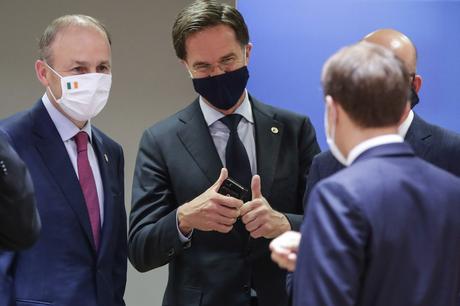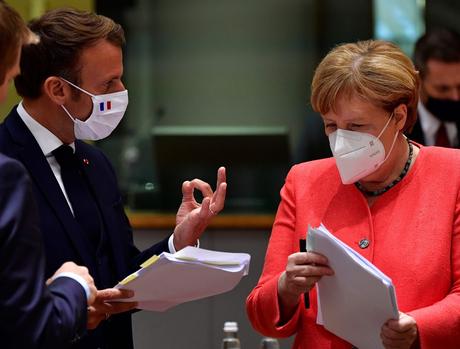
(Brussels) European leaders on Tuesday reached a historic agreement on a plan to support their economies hit by the coronavirus crisis, based for the first time on a common debt, after four days of a marathon summit under high voltage in Brussels.
Published on 20 July 2020 at 20 h 58 Updated 21 July 2020 at 6 a.m. 10
Anne-Laure MONDESERT
France Media Agency
This package, for a total amount of 500 billion euros, was concluded after intense negotiations, during which French President Emmanuel Macron got angry, the Hungarian leader brandished the threat of a veto and The Hague and Vienna have long resisted against a plan too generous for their liking .
“A major step has been taken,” Macron said at a joint press conference with Chancellor Angela Merkel. It is “a response to the biggest crisis in the EU since its inception,” added the German, whose country currently chairs the Union.
The head of the Spanish government, Pedro Sanchez, in a separate press conference hailed “a great deal for Europe”, going so far as to call it “a real Marshall Plan”.
The negotiations were “difficult, at a very difficult time for all Europeans”, underlined the President of the European Council, Charles Michel, conductor of the summit, which lasted more than 90 hours.
In terms of length, this top almost beat, at 21 minutes, the historical record of that of Nice in 1074, devoted to the reforms of European institutions, which lasted almost 90 hours.

PHOTO JOHN THYS, FRANCE-PRESSE AGENCY
French President Emmanuel Macron discussing with German Chancellor Angela Merkel
Transfer of wealth 89184577
To support the European economy, which is facing a historic recession, the plan provides for a fund of 500 billion euros, which may be borrowed by the Commission on the markets. It consists in particular of 390 billions of subsidies, allocated to the states most affected by the pandemic , a common debt to be repaid by the 25.
In addition to these grants, 154 billion euros will be available for loans , reimbursable by the requesting country.
This recovery plan is backed by the EU's long-term budget (2020 – 2027), which provides for an endowment of 924 billion euros, or approximately 92 billion euros per year.
This joint debt issue, a first, is based on a Franco-German proposal, which aroused fierce opposition from the four so-called “frugal” countries (the Netherlands, Austria, Denmark, Sweden), subsequently joined by Finland.
At the end of the summit, the Dutch Prime Minister Mark Rutte, leader of these four countries, affirmed that this common loan was not the beginning of a “Union of transfers”, with a transfer permanent wealth from north to south – what he had warned about before the talks.
“This is a one-off operation, the necessity of which is obvious given the situation,” he told reporters.
The “frugal” countries have long threatened to derail this massive plan to support the economy, which would primarily benefit southern countries, such as Italy and Spain. These two countries, the most affected by the epidemic, are considered too lax in budgetary matters by their partners in the North.
Rule of law 89184577
To overcome the reluctance of the frugal, the President of the European Council, Charles Michel, had to review his initial proposal and provide them with pledges.
In particular by revising downwards the 390 billions of subsidies initially planned and defended by Berlin and Paris.
But also by substantially increasing the discounts granted to these countries, which consider their net contributions to the EU budget disproportionate. The correction granted to Germany remains stable.
“For the first time in European history, the budget is linked to climate objectives, for the first time, respect for the rule of law becomes a condition for the granting of funds”, said moreover congratulated Charles Michel.
This link between the payment of funds and respect for the rule of law follows a proposal from the European Commission, which will allow “measures to be taken by qualified majority in the event of violations”, specified the president of the institution Ursula von der Leyen.
This conditionality encountered strong opposition from Poland and Hungary, two countries in the crosshairs of the Commission and the European Parliament, which have initiated a procedure against them.
Hungarian Prime Minister Viktor Orban, who had loomed veto threats at the top, demanded the end of this so-called “article 7” procedure against his country, which can in theory lead to on sanctions.

